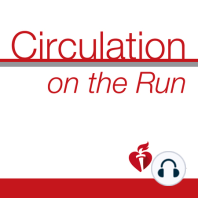17 min listen
Circulation September 11, 2018 Issue
ratings:
Length:
20 minutes
Released:
Sep 10, 2018
Format:
Podcast episode
Description
Dr Carolyn Lam: We start today's podcast with a few words from our Editor-in-Chief, Dr Joe Hill. Dr Joe Hill: I speak with you today with a heavy heart as we recently lost an esteemed and beloved colleague, Professor Bongani Mayosi. Bongani was a pioneering leader, a renowned investigator, Dean of the Medical School at the University of Cape Town, and an important member of our Circulation editorial leadership team. Bongani had an abiding passion for the under-served, especially those in his native Africa. He died tragically and suddenly at the early age of 51, just 10 days after recording the podcast you're about to hear. We mourn the loss of this colleague and our hearts go out to his family. It is a very poignant moment, as we hear his voice once again. We grieve deeply, and are reminded of Bongani's towering achievements and contributions to the betterment of our world. Dr Carolyn Lam: Welcome to Circulation on the Run, your weekly podcast summary and backstage pass to the journal and its editors. I'm Dr Carolyn Lam, associate editor from the National Heart Center and Duke National University of Singapore. CD4-positive T cells play an important role in atherosclerosis, but their antigen specificity is poorly understood. Today's paper describes the first study to detect apolipoprotein B peptide 18 specific CD4 T cells in mice and humans. First author Dr Kimura, corresponding author Dr Ley from La Jolla Institute of Allergy and Immunology and their colleagues constructed novel P18 tetramers to detect human and mouse APOB-specific T cells and assayed their phenotypes by flow cytometry. They found that these P18 specific T cells were mainly anti-inflammatory regulatory T cells in healthy donors, but co-expressed other CD4 lineage transcription factors in patients with sub-clinical cardiovascular disease. Immunization with P18 reduced atherosclerotic burden in APOE deficient mice and induced antigen specific T regulatory cells. This study therefore, identifies APOB peptide 18 as the first T regulatory APOtope in human atherosclerosis. The next study suggests that testing intracellular calcium handling in circulating B lymphocytes may be a novel biomarker for monitoring patients with heart failure. During [inaudible 00:02:47] intracellular calcium is released from sarcoplasmic reticulum into the cytoplasm through Type II ryanodine receptor calcium release channels. In heart failure chronically elevated, circulating catecholamine levels cause pathologic remodeling of these Type II receptors, resulting in diastolic sarcoplasmic reticulum calcium leak, thus decreasing myocardial contract [inaudible 00:03:09]. Similarly, skeletal muscle contraction requires sarcoplasmic reticulum calcium release and this occurs through Type I ryanodine receptors. Chronically elevated catecholamine levels in heart failure cause Type I mediated sarcoplasmic reticulum calcium leak, thus contributing to skeletal myopathy and weakness. In today's paper, first author Dr Kushner. Co-corresponding authors Dr Kitsis from Albert Einstein College of Medicine and Dr Marx from Columbia University, New York hypothesized, that since circulating B lymphocytes express Type I ryanodine receptors, they may be a potential surrogate for defects in intracellular calcium handling due to leaky ryanodine channels in heart failure. Indeed, they found that circulating B lymphocytes from humans and mice with heart failure exhibited remodeled Type I ryanodine receptors and decreased endoplasmic reticulum calcium stores, consistent with chronic intracellular calcium leak. This calcium leak correlated with circulating catecholamine leve
Released:
Sep 10, 2018
Format:
Podcast episode
Titles in the series (100)
Circulation January 24, 2017 Issue: Circulation Weekly: Your Weekly Summary & Backstage Pass To The Journal by Circulation on the Run
